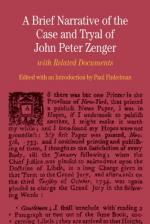|
This section contains 3,215 words (approx. 11 pages at 300 words per page) |

|
Reprinted in Eyewitness to America
Published in 1997
". . . .Men who injure and oppress the people under their administration provoke them to cry out and complain; and then make that very complaint the foundation for new oppressions and prosecutions."
Freedom of the press is the liberty to publish information, regardless of content, without the approval or control of government agencies. It is considered one of the most important rights in a democratic society. During the colonial period, however, there was no freedom of the press. Throughout Europe publication of information was tightly monitored in order to suppress public criticism of religious leaders and monarchs (heads of kingdoms or empires). According to English law, which was also the law of the American colonies, criticism of the government in any...
|
This section contains 3,215 words (approx. 11 pages at 300 words per page) |

|


